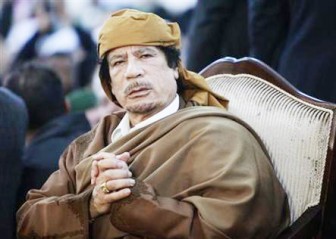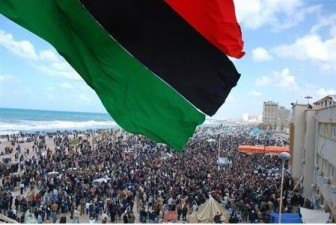TRIPOLI, (Reuters) – Libyan leader Muammar Gaddafi appeared on state television today signalling his defiance in the face of a mounting revolt against his 41-year rule.
“I am in Tripoli and not in Venezuela,” he said, under a large umbrella, leaning out of the front seat of a van. Reports on Monday said Gaddafi had fled to Venezuela, ruled by his friend and fellow revolutionary President Hugo Chavez.
Libyan forces loyal to Gaddafi have fought an increasingly bloody battle to keep the veteran leader in power with residents reporting gunfire in parts of the capital Tripoli and one political activist saying warplanes had bombed the city.
Security forces had killed dozens of protesters across the country, human rights groups and witnesses said, prompting widespread condemnation from world leaders.
U.S. Secretary of State Hillary Clinton said it was “time to stop this unacceptable bloodshed” in Libya.
State TV showed government supporters rallying and Gaddafi’s son Saif al-Islam Gaddafi said warplanes had hit only ammunition dumps. He did not say why jets had carried out the air strikes, but on Sunday he accused protesters of raiding ammunition depots in the eastern city of Benghazi.
No independent verification of the reports was available and communications with Libya from outside were difficult.
Cracks were beginning to appear within the ranks of Gaddafi’s supporters.
A group of army officers issued a statement urging fellow soldiers to “join the people” and help remove Gaddafi, Al Arabiya television said.
The justice minister resigned in protest at the “excessive use of violence” against protesters and diplomats at Libya’s mission to the United Nations called on the Libyan army to help overthrow “the tyrant Muammar Gaddafi”. (See other story below)
TRIPOLI, (Reuters) – Libyan leader Muammar Gaddafi fought an increasingly bloody battle to hang on to power today when protests against his 41-year rule struck the capital Tripoli after days of violence in the east.
Residents reported gunfire in parts of Tripoli and one political activist said warplanes had bombed the city. But state television showed government supporters rallying in Tripoli.
Forces loyal to Gaddafi had killed dozens of people across the country, human rights groups and witnesses said, prompting widespread condemnation from foreign governments.
No independent verification of the reports was available and communications with Libya from outside were difficult.
But a picture emerged of a leader who has loomed large on the world stage for decades and controls vast reserves of oil fighting for survival. Brent crude prices hit $108 a barrel on fears the violence could disrupt supplies from Libya.

“What we are witnessing today is unimaginable. Warplanes and helicopters are indiscriminately bombing one area after another. There are many, many dead,” Adel Mohamed Saleh said in a live broadcast on al Jazeera television. “Anyone who moves, even if they are in their car they will hit you.”
U.S. Secretary of State Hillary Clinton said it was “time to stop this unnacceptable bloodshed” in Libya.
Both Libya and Venezuela denied reports that Gaddafi had fled to the South American country ruled by his friend and fellow revolutionary President Hugo Chavez.
Al Arabiya television said Gaddafi would give a speech shortly without giving details. Libyan state television news at 2200 GMT did not mention any speech by Gaddafi.
Gaddafi’s son Saif al-Islam Gaddafi denied reports of warplanes bombing Tripoli and Benghazi and told the official Libyan news agency that bombings took place on ammunition dumps in remote locations away from residential areas.
But two Libyan fighter jets landed in Malta, their pilots defecting after they said they had been ordered to bomb protesters, Maltese government officials said.
An analyst for London-based consultancy Control Risks said the reported air strikes indicated the end was near for Gaddafi.
“These really seem to be last, desperate acts. If you’re bombing your own capital, it’s really hard to see how you can survive, ” its Middle East anaylst Julien Barnes-Dacey said.
The demonstrations spread to Tripoli, on the Mediterranean Sea, after several cities in the east, including Benghazi, appeared to fall to the opposition, according to residents.
Human Rights Watch said at least 233 people had been killed in five days of violence, but opposition groups put the figure much higher.
PARLIAMENT BUILDING ON FIRE

A coalition of Libyan Muslim leaders told all Muslims it was their duty to rebel against the Libyan leadership because of its “bloody crimes against humanity”.
The building where the General People’s Congress, or parliament, meets in Tripoli was on fire on Monday, as was a police station in an eastern suburb, witnesses said.
Al Jazeera television quoted medical sources as saying 61 people had been killed in the latest protests in Tripoli.
It said security forces were looting banks and other government institutions in Tripoli, and protesters had broken into several police stations and ransacked them.
Saif al-Islam said his father would fight the revolt until “the last man standing”.
Some analysts suggested Libya was heading for civil war.
“I think what’s going to happen is going to be much more chaotic than what we saw in Egypt or Tunisia. Gaddafi and his sons don’t have anywhere else to go … They are going to fight,” said North Africa analyst Geoff Porter, contributor to political risk consultancy Wikistrat.
Output at one of Libya’s oil fields was reported to have been stopped by a workers’ strike and some European oil companies withdrew expatriate workers and suspended operations. Most of Libya’s oil fields are in the east, south of Benghazi.
Anti-government protests have also broken out in the central town of Ras Lanuf, the site of an oil refinery and petrochemical complex, Libya’s Quryna newspaper said on its website on Monday. Libyan border guards have withdrawn from their side of the border with Egypt and people’s committees were now in control of the crossing, the Egyptian army said, without making if clear if the groups now in control of the border were loyal to Gaddafi.
In signs of splits within Libya’s ruling elite, the justice minister resigned in protest at the “excessive use of violence” against protesters. In India, Libya’s ambassador said he was resigning in protest at the violent crackdown.
PROTESTERS CONTROL BENGHAZI
Gaddafi supporters were in central Tripoli’s Green Square on Monday, waving flags and carrying his portrait, Libyan state TV showed.
The anger unleashed after four decades of rule by Gaddafi mirrors events in Egypt where a popular revolt overthrew the seemingly impregnable President Hosni Mubarak 10 days ago.
In Benghazi, cradle of the uprising, protesters appeared to be largely in control after clashes with troops and police in which dozens of civilians were killed.
Salahuddin Abdullah, a self-described protest organiser, said: “In Benghazi there is celebration and euphoria … The city is no longer under military control. It is completely under demonstrators’ control.”
At least nine towns in the east were under the control of protesters loyal to tribal groups, the president of the International Federation for Human Rights in France said.
Libya is Africa’s fourth biggest oil exporter, producing 1.6 million barrels a day. The oil price jumped $3 to $89.50 a barrel for U.S. crude on fear the unrest could disrupt supplies.




